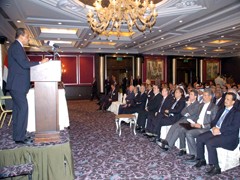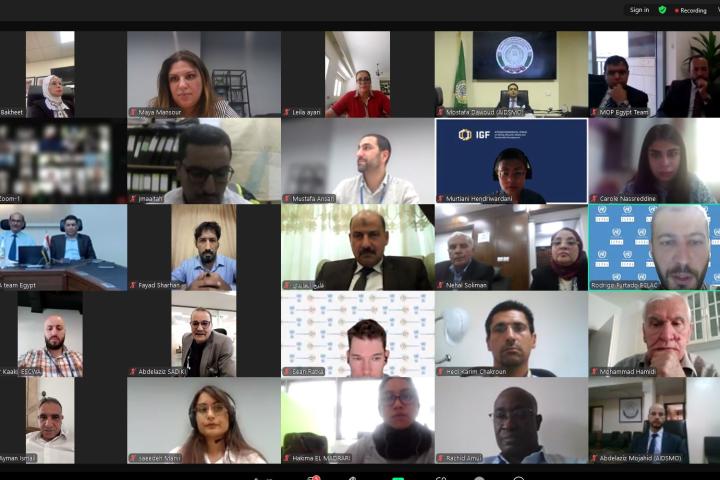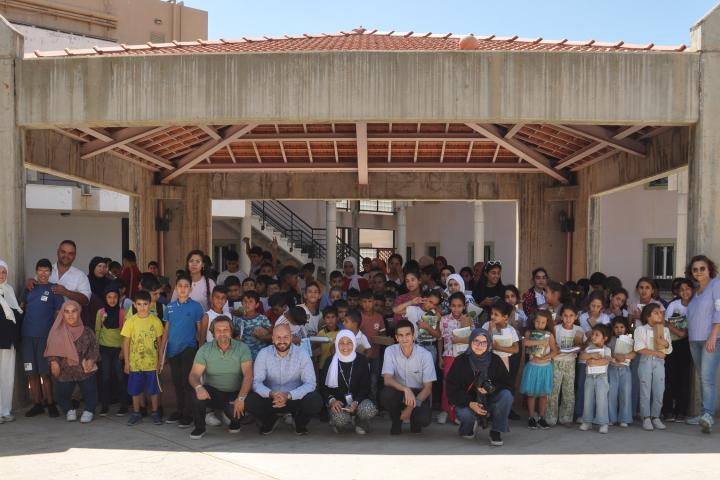ESCWA Executive Secretary Bader Omar AlDafa noted in the opening of the "Regional High-Level Consultative Forum on the Impacts of the International Financial Crisis on the ESCWA Member Countries: the Way Forward" that the United Nations remained the main party concerned with the financial crisis and entrusted with working towards the achievement of the Millennium Development Goals (MDGs) and internationally-agreed development initiatives as well as restructuring a new financial order. From this stand, the Organization has convened this meeting, gathering decision makers and international experts.
In organizing the meeting, ESCWA has partnered with the International Labour Organization (ILO) and the Syrian State Planning Commission. The meeting is intended to examine the future repercussions of the global financial crisis over ESCWA member countries, and extends from Tuesday 5 until Thursday 7 May in Dedeman Hotel, Damascus.
In his opening statement, AlDafa underscored the view of the Organization, stipulating that efforts will only bear fruit if the crisis is dealt with by effectively dealing with differences between developed and developing countries, ensuring a periodic review of essential policies and increased social security, and prioritizing job creation and poverty alleviation. It is also very crucial to establish the right bases for true sustainable development.
With participants from over 14 countries and 80 representatives of regional organizations, Arab development funds, private and central banks, the meeting delves into the repercussions of the global financial crisis over financial, economic and social fields in member countries, as well as the best ways to counter them. By gathering this particular crowd, the meeting will allow participating countries to share their experiences and views concerning the measures to deal with the crisis. It will also be a forum for them to harmonize and unify their points of view prior to the high-level meeting on the economic crisis to be held at the UN headquarters in New York, on 1-3 June 2009.
Syrian Deputy Prime Minister for Economic Affairs Abdullah Al Dardari said that the power of countries is no longer appraised by the size of their economies in the global markets. Rather, this power is measured by their success in managing their national economies and upholding their responsibilities within the new global economy both on the economic and social levels, especially when they place the individual as the starting and end points of development.
For his part, Maurizio Bussi, ILO deputy regional director presented the losses of national economies in the financial crisis, and the ways to counter such losses, underscoring the importance of holding such a meeting at a time of escalating crisis. Bussi noted that the general rate of growth dropped from 7.2 to 3.2 per cent, which affects the Arab economy, global trade, as well as unemployment and job opportunities. This requires constant work among all countries, to avoid further decline in the labour market and the establishment of a fair work system that serves the individual well.
After the opening session, ESCWA launched its flagship publication, the "Annual Review of Developments in Globalization and Regional Integration in the Arab Countries, 2008". The review monitors developments in the ESCWA and Arab regions through specific indicators of economic development, and regional integration, with focus on Arab electrical linkages and Information and Communication Technologies.




